13 best electrical contractor software in 2026

If you are looking to grow your electrical company, you may be wondering how businesses offering the same services have scaled to earn more than $2.5 million per year. While there are several factors involved, one thing is for certain: they didn’t get there by doing everything manually.
If you’ve just started out, there will come a time when clipboards and spreadsheets won’t cut it anymore. As your crew grows, your projects become more complex. And sticking to the old ways will hold you back.
Perhaps you’re juggling service calls, trying to track which technician is where, manually creating invoices, and hoping nothing falls through the cracks. Meanwhile, your competitors are using electrical contractor software to streamline their operations and win more business.
The electrical contracting industry is competitive. Customers expect quick responses, accurate estimates, and professional service. If you’re still handwriting quotes or using basic spreadsheets to manage your business, you’re fighting an uphill battle.
Electrical business software helps you go digital, but also helps you work smarter. The right electrician software solution can transform how you run your electrical contracting business, from initial customer contact to final invoice.
In this guide, we’ll break down the top 13 electrical contractor software options available in 2025. We’ll look at what makes each one unique, their pricing, and which type of electrical business they work best for.
Field service software
Before we look into electrical-specific software, let’s talk about field service management software in general.
These platforms aren’t just for electricians. They’re designed for any business that sends technicians out to customer locations.
Plumbers, HVAC technicians, landscapers, and cleaning services all use similar software. The core features remain the same: scheduling, dispatching, invoicing, and customer management.
What changes is the industry-specific functionality.
For electricians, that might mean electrical estimating tools, code compliance tracking, or integration with electrical supply distributors. For plumbers, it could be pipe sizing calculators or water pressure testing logs.
The beauty of modern field service software is its flexibility. Many platforms can be customized for your specific trade, even if they weren’t originally designed for electrical contractors.
What is electrical contractor software?
Electrical contractor software is a digital solution that helps manage daily business operations. It acts as a central hub for customer info, project timelines, estimates, invoices, inventory, and team communication.
Some tools focus on estimating and bidding. Others are built for field service. The best platforms combine these functions into a single system to eliminate chaos. No more lost paperwork, missed follow-ups, or double-booked techs.
The result is a more organized, efficient, and profitable electrical business.
How does electrical contractor software work?
Most platforms are cloud-based, so you can access them from the office, job site, or anywhere with Wi-Fi.
Here’s a typical flow:
- A customer calls in. The software logs the request and schedules a tech.
- The technician gets job details on their phone, including history and instructions.
- On-site, they update progress, access diagrams, take photos, and check inventory.
- Once finished, they generate an invoice on the spot. The customer pays via app, and the system marks the job complete.
Behind the scenes, you’re watching everything in real time (job status, payments, and team productivity) all without picking up the phone.
What does the best electrical service software offer?
Not all electrical contractor software is the same. The best platforms share certain key features that make them worth the investment. Here’s what to look for.
Save time on scheduling and dispatching
Manual scheduling can easily become a nightmare when you’re juggling certifications, travel time, surprise cancellations, and more. It’s like solving a puzzle that keeps changing by the minute.
Top-tier electrical software automates this chaos. It knows which techs are available, what skills they have, and where they’re working. When a new job comes in, the system can instantly recommend the best fit.
Send invoices quicker
Getting paid starts with faster billing. The best platforms let technicians create and send invoices from their phones while still on-site.
That means fewer mistakes, no missed charges, and less paperwork waiting at the office.
Many systems offer online payments, too. Customers can pay by card or bank transfer in seconds. And for late payments, automatic reminders do the chasing for you.
Create estimates in a flash
Winning jobs often comes down to who can provide an accurate estimate the fastest.
The best software helps you win jobs faster with built-in templates, labour calculators, and real-time material costs pulled from supplier databases.
And yes, mobile estimating is a must. A tech should be able to quote on the spot and recognize opportunities for additional work, turning simple fixes into bigger projects before leaving the site.
Facilitate team communication
Electrical work often involves multiple team members. Good software bridges the handoff between techs. They can leave notes, upload photos, and update job status in real time.
Everyone stays informed. No missed details and no guesswork. Some platforms even offer in-app messaging to keep conversations job-specific and logged for reference.
Best electrical contractor software
Now, let’s look at the top 13 electrical contractor software options available in 2026. We’ll break down what makes each one unique, their pricing structure, and which type of electrical business they work best for.
Method CRM: Field Services
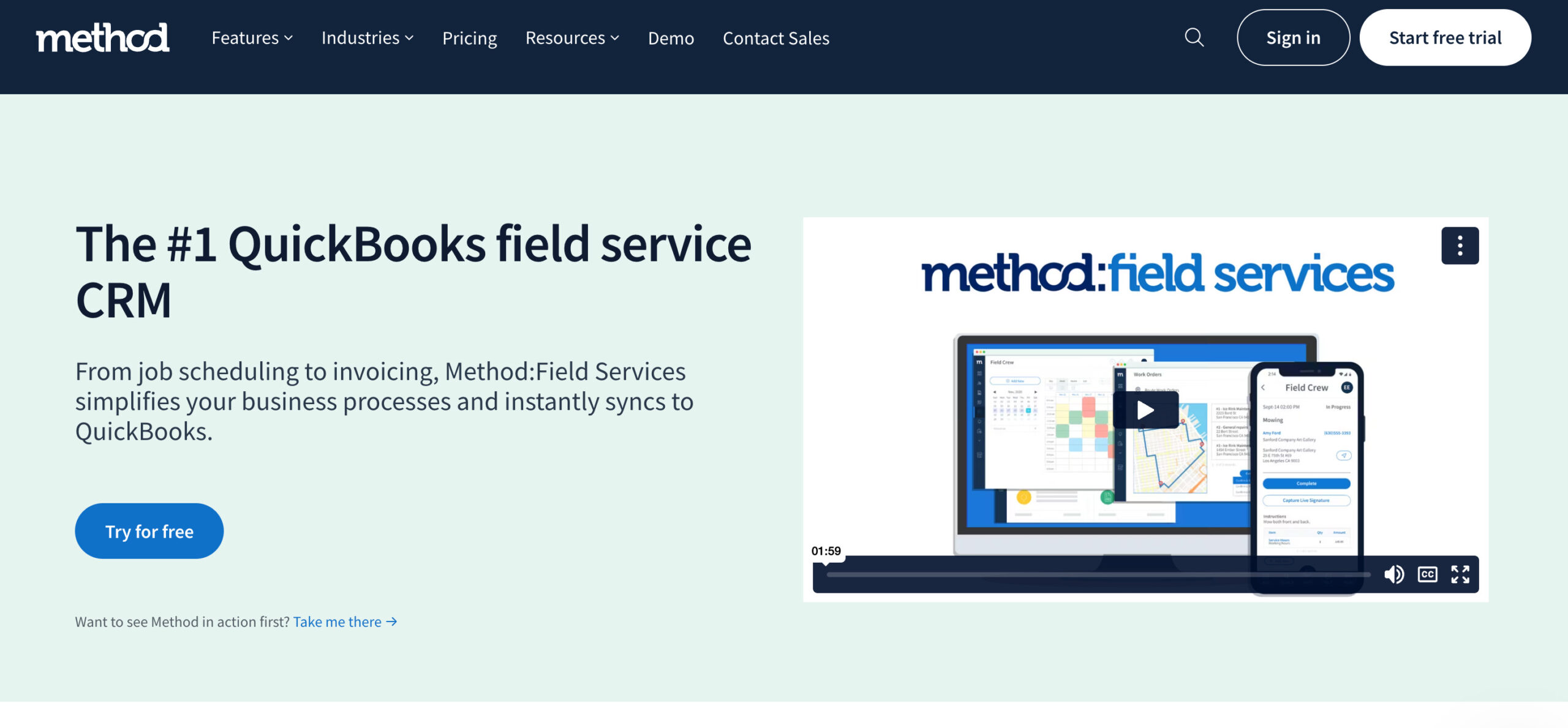
Method’s field service management software is built for service businesses like electrical contracting. What makes it stand out is its seamless QuickBooks integration, making it perfect for businesses already using QuickBooks online or desktop for accounting.
From the first customer call to the final invoice, Method manages everything in one platform: CRM, scheduling, dispatching, invoicing, and payment collection.
For electricians, Method offers customizable workflows tailored to different job types, residential calls, commercial installs, or emergency repairs. The mobile app gives techs real-time access to job details and allows them to update progress and accept payments from the field.
One of Method’s biggest strengths is flexibility. You’re not stuck with a generic setup. Want to track electrical permits or manage subcontractors? Their team can tailor the system to match your exact workflow.
The platform also includes detailed reporting tools. You can track metrics like job profitability, tech efficiency, and customer satisfaction to guide business decisions.
Plans and pricing
- Field crew starts at $15/month per field crew technician (or $18 if billed monthly). It’s best for tracking and planning jobs on the road.
- Dispatcher is $45/month per dispatcher (or $49 monthly) and offers easy job scheduling, dispatching, and invoicing.
Viewpoint

Viewpoint focuses on construction project management, making it a good fit for electrical contractors who handle large commercial projects. The platform is designed for businesses that need to track multiple projects simultaneously, manage subcontractors, and handle complex billing arrangements.
Its features include scheduling, resource allocation, and progress tracking. For contractors working on new construction or major renovations, these tools help keep things on schedule and within budget.
Plans and pricing
Viewpoint uses custom pricing based on company size and feature requirements. Most electrical contracting businesses can expect to pay $150-$300 per user per month.
TurboBid
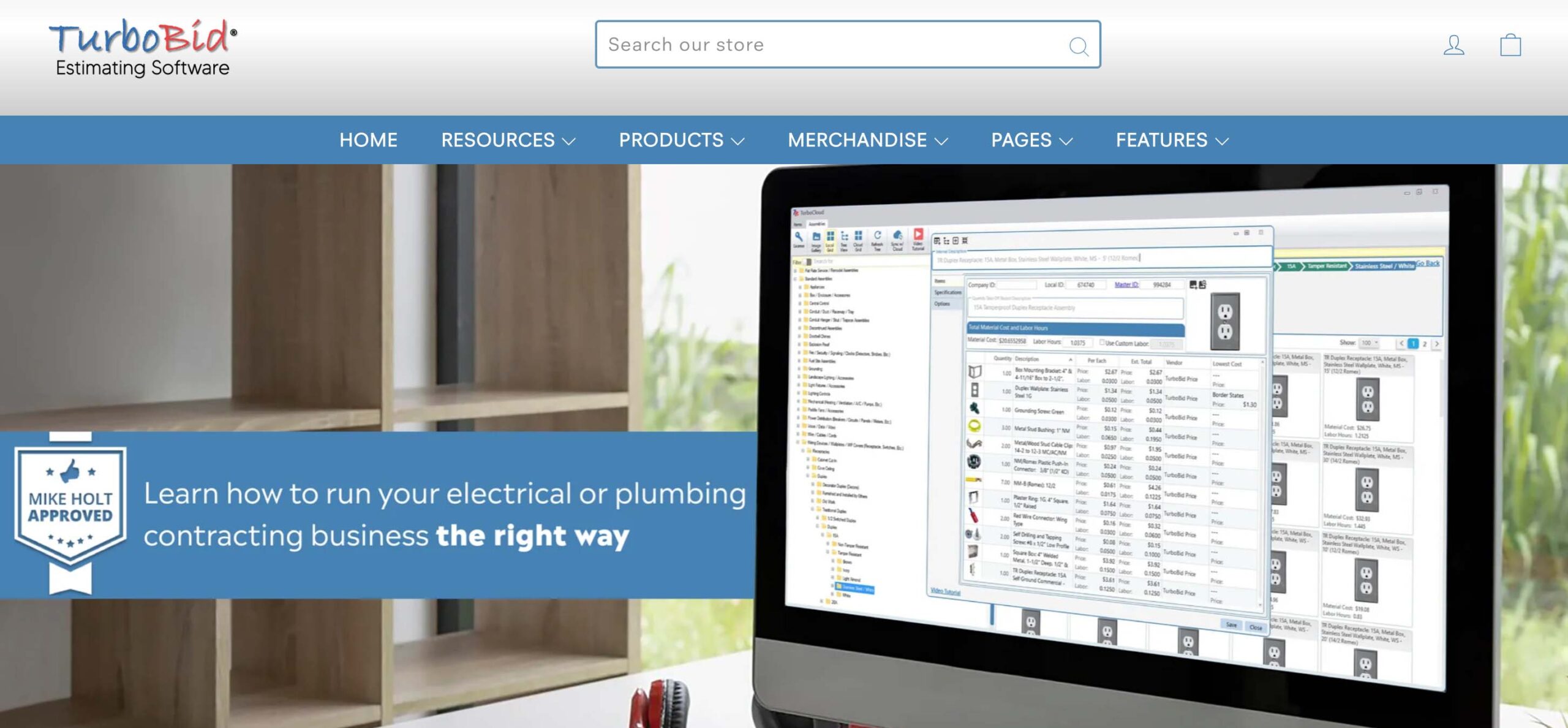
TurboBid specializes in electrical estimating and bidding. If your focus is on commercial jobs or large-scale residential installs, TurboBid’s detailed estimating features are a major asset.
One of its standout features is integration with electrical design software. You can import plans, generate material lists, and optimize your estimating process. TurboBid does include basic project tracking tools, but it’s not a full-scale field service platform.
Plans and pricing
TurboBid starts at $135/month with a subscription model. A $350 setup fee is required but is refundable if you upgrade to a lifetime license later.
A one-time purchase costs $1,395 and includes six months of support plus TurboCloud for weekly material pricing updates.
Fieldwire

Fieldwire is a project management platform ideal for electrical contractors managing complex commercial builds. It’s strong on plan coordination, team collaboration, and field communication.
You can assign tasks to techs, track work in real time, and keep jobs moving. The mobile app makes plan access and progress reporting easy from the field. Photo documentation is baked in; techs can snap a picture, tag it, and save it by project and date.
Plans and pricing
Fieldwire offers a free plan for small teams, which includes task management, plan viewing, checklists, file storage, and photos. It’s enough to test the waters and run light jobs, without taking out the credit card. Paid plans start at $39 per user per month (annual billing).
McCormick Estimating Software

McCormick has served electrical contractors since 1983. It offers detailed estimating tools with labour and material databases built for residential, commercial, and industrial work. Real-time pricing from distributors keeps estimates accurate. The platform includes basic project tracking but isn’t a full business management system.
Plans and pricing
McCormick pricing varies based on the specific modules you need. Basic estimating software starts around $300 per month.
Planswift
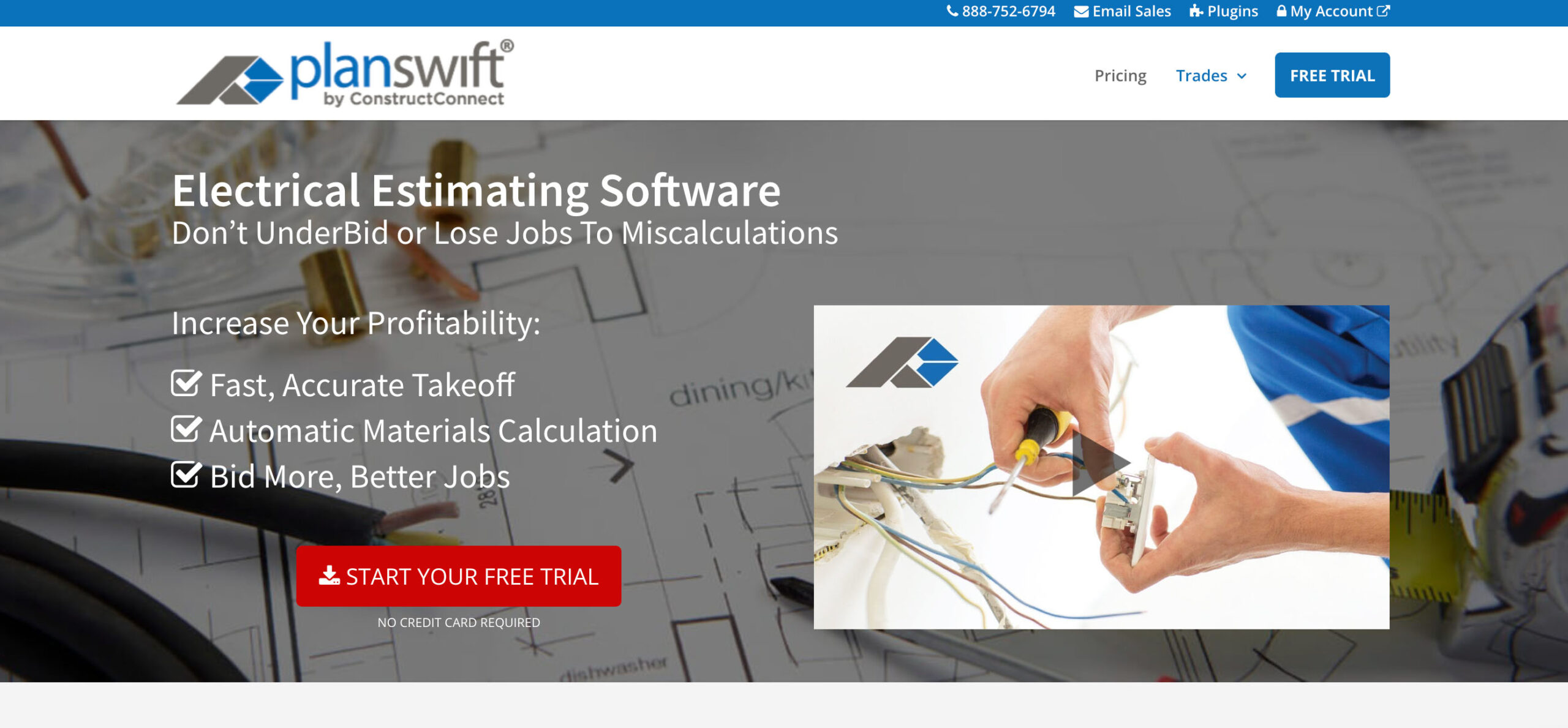
Planswift is a takeoff and estimating tool built for contractors who need to measure materials straight from digital plans. It lets electrical contractors calculate conduit lengths, wire runs, and outlet counts directly from PDFs or CAD drawings.
The platform eliminates the need for manual measuring. Just point and click, and it calculates areas and lengths automatically, reducing error and boosting speed.
Plans and pricing
Planswift starts at a one-time license fee of around $2,000. There are no recurring monthly costs unless you add upgrades or customer support services, making it ideal for contractors who mainly need estimating functionality.
Tradify
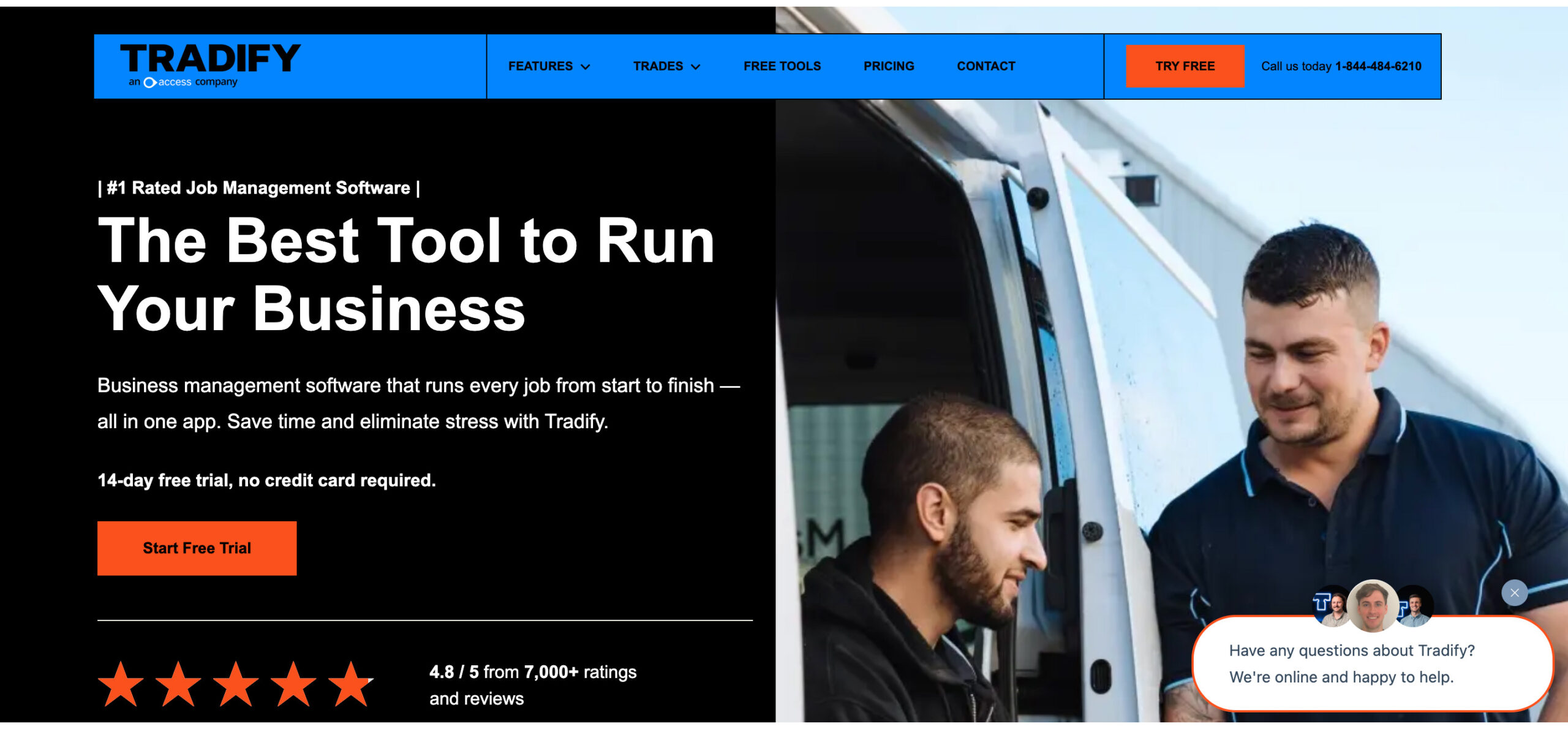
Tradify targets small to mid-sized trade businesses with a clean interface and simple workflows. For electrical contractors, it offers quoting, job scheduling, invoicing, and CRM tools in one app.
Its user-friendly mobile app makes it easy for technicians to update jobs, add photos, and sync progress back to the office. Customer management features allow you to set follow-up reminders and manage ongoing service work.
Plans and pricing
- Lite ($47/month): Core tools like job tracking, invoicing, and Google Calendar sync.
- Pro ($51/month): Adds branded documents, recurring jobs, progress billing, and personal task tracking.
- Plus ($61/month): Includes AI tools like SmartRead and SmartWrite, service reminders, purchase orders, and robust reporting.
Accubid Electrical Estimating
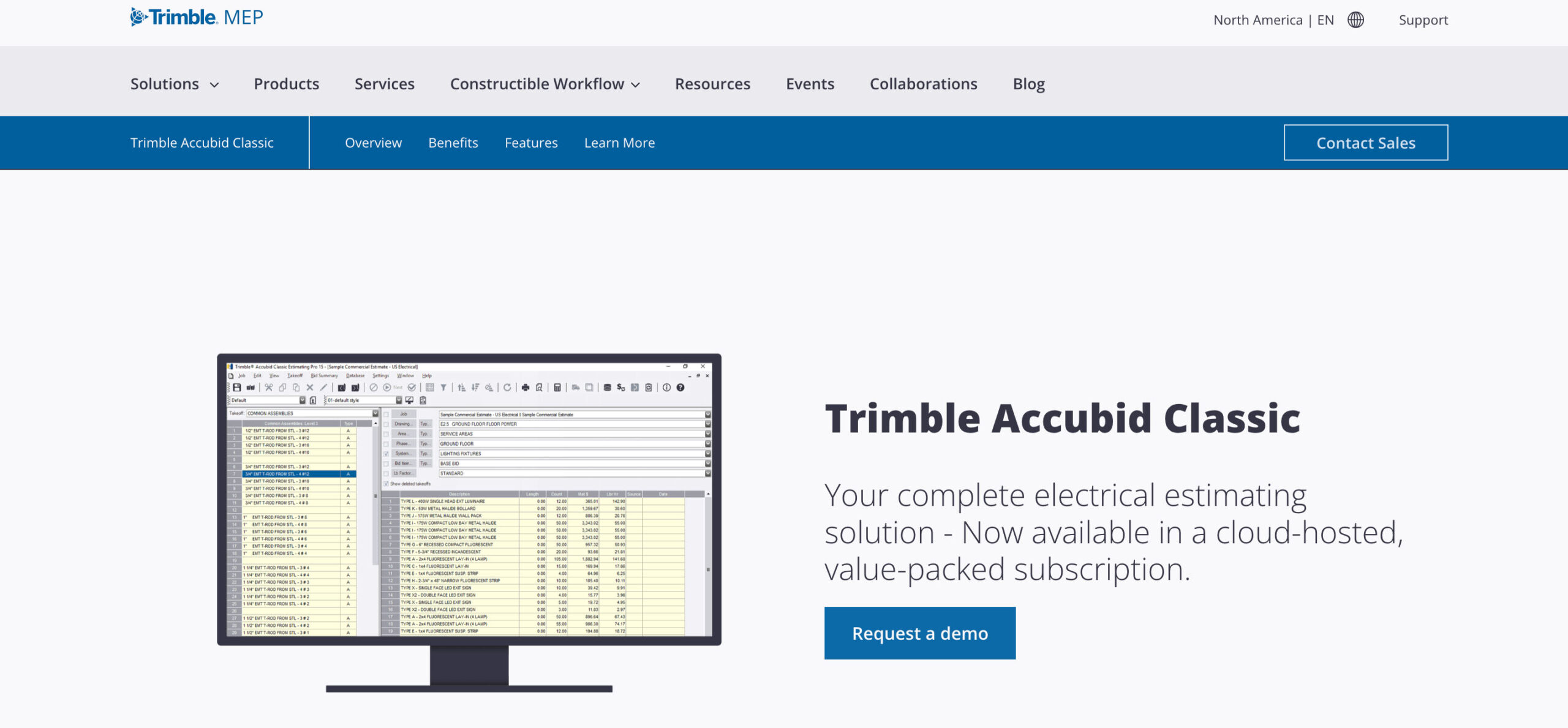
Built by Trimble, Accubid is a high-end solution for commercial and industrial electrical contractors. It’s known for its deep material databases and accurate labour cost tracking.
The platform helps you create detailed, professional estimates using real-world pricing and preloaded assemblies. It also supports change orders, job costing, and advanced reporting.
Plans and pricing
The classic version starts at $2,000 for a perpetual license. Alternatively, the Estimating Essentials subscription includes LiveCount and other features, with an estimated annual cost of $3,000 per user.
Contractor Foreman
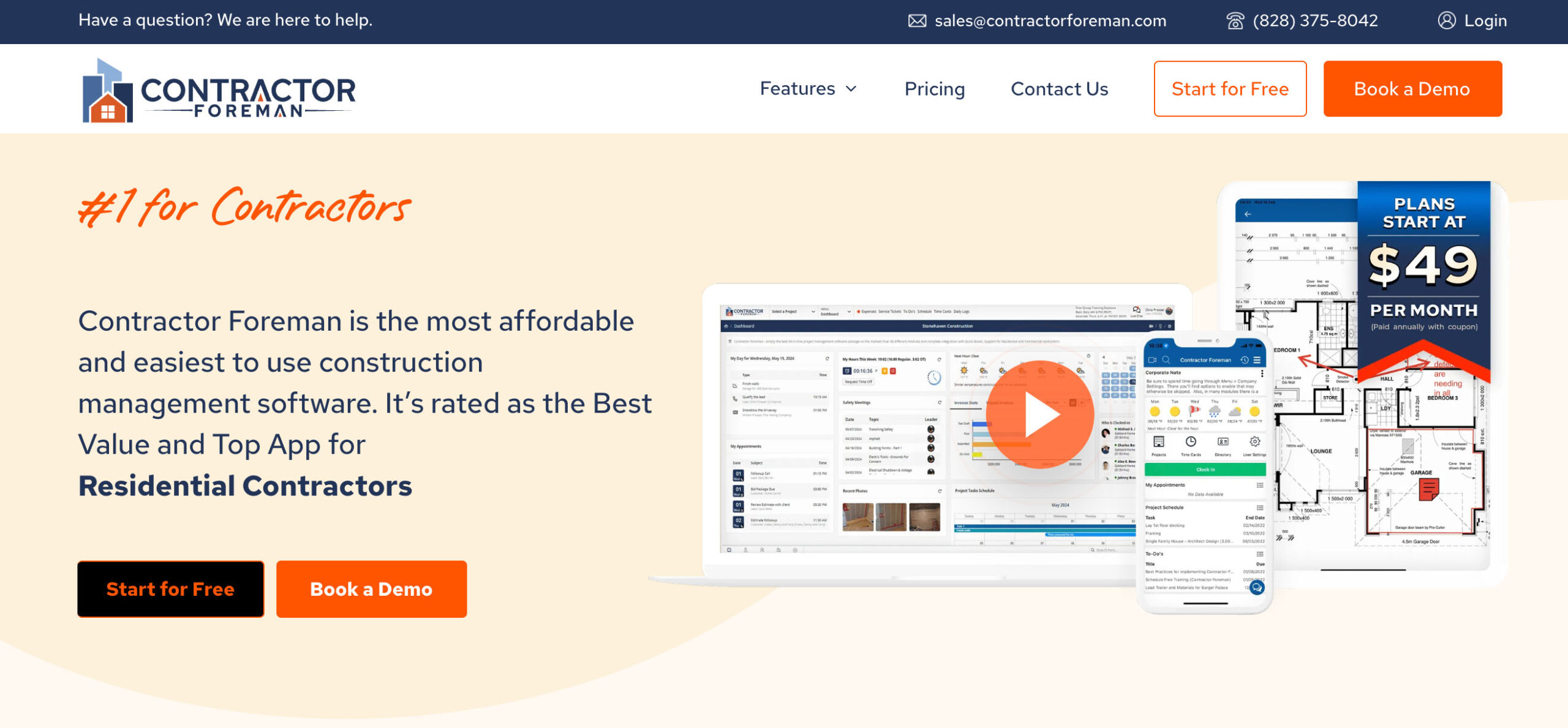
Contractor Foreman is a full project management suite offering scheduling, estimating, time tracking, CRM, and more, all optimized for field service teams. For electricians, it provides customizable workflows, safety checklists, time cards, and forms tailored to different job types.
Plans and pricing
- Basic ($49/month): Single user access, with tools for scheduling, client portals, work orders, and daily logs.
- Standard ($79/month): Adds users (up to 3), inspections, and light training.
- Plus ($125/month): Expands to 8 users and includes online payments, bid management, and 4 hours of private training.
- Pro ($166/month): Up to 15 users, with AIA-style billing, subcontractor tools, and advanced job costing.
- Unlimited ($249/month): All features, no user limit, full integrations, and dedicated support.
All plans include a 30-day free trial and a 100-day money-back guarantee.
STACK
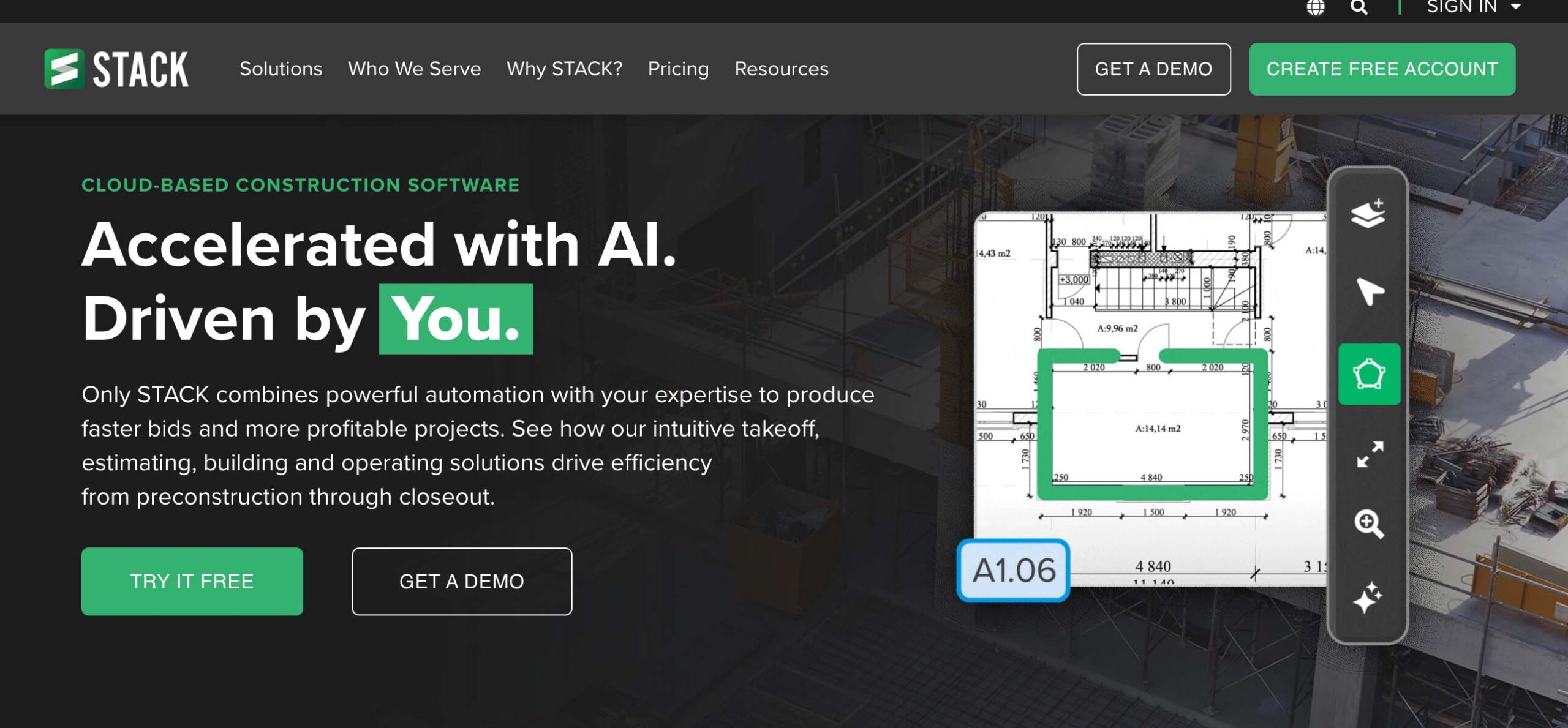
STACK focuses on construction takeoff and estimating. Its digital takeoff capabilities can be valuable for electrical contractors who need to generate material lists from project plans.
The platform allows you to import digital plans and measure quantities directly from the drawings. You can calculate conduit runs, count electrical devices, and determine material requirements without manually measuring plans.
Plans and pricing
- Takeoff & Estimating (1 user): $2,999/year
- Takeoff & Estimating (2+ users): $2,599/user/year
- Pro (1 user): $3,899/year
- Pro (2+ users): $3,399/user/year
Powered Now

Powered Now is built for field service companies that want mobile-first software. It’s also easy for electricians to use for scheduling, invoicing, quotes, and customer communication.
Its interface is clean and easy to learn, ideal for small electrical teams or solo operators.
Plans and pricing
The platform offers three main plans, all billed per user per month:
- Business Plan – $35/month: Core features like job tracking and scheduling
- Professional Plan – $39/month: Adds staff scheduling and better collaboration
- Premium Plan – $48/month: Unlocks detailed reporting, routing, and inventory management
Knowify
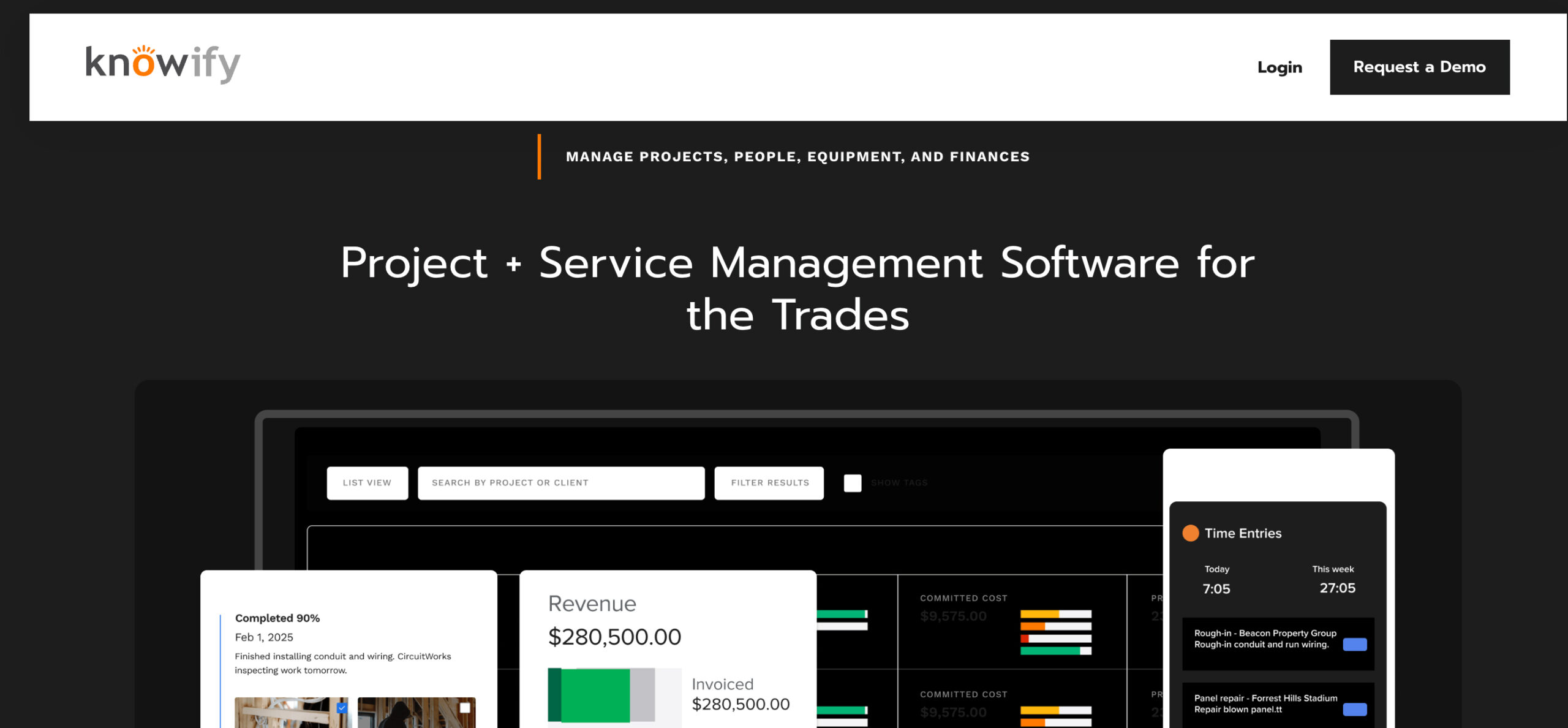
Knowify is designed for small to medium-sized contracting companies, including electrical contractors. The platform combines project management, estimating, and accounting software features in one system.
For electrical contractors, Knowify offers job costing features that help track profitability on different types of work. You can see which electrical jobs are most profitable and identify areas for improvement.
Plans and pricing
- Core – $99/month (1 user): Includes quotes, AIA billing, and project tracking
- Advanced – $249/month (1 user): Adds budget tools, job costing, and deeper reporting
- Enterprise – Custom pricing: Unlimited users, inventory control, and automation
Field Complete
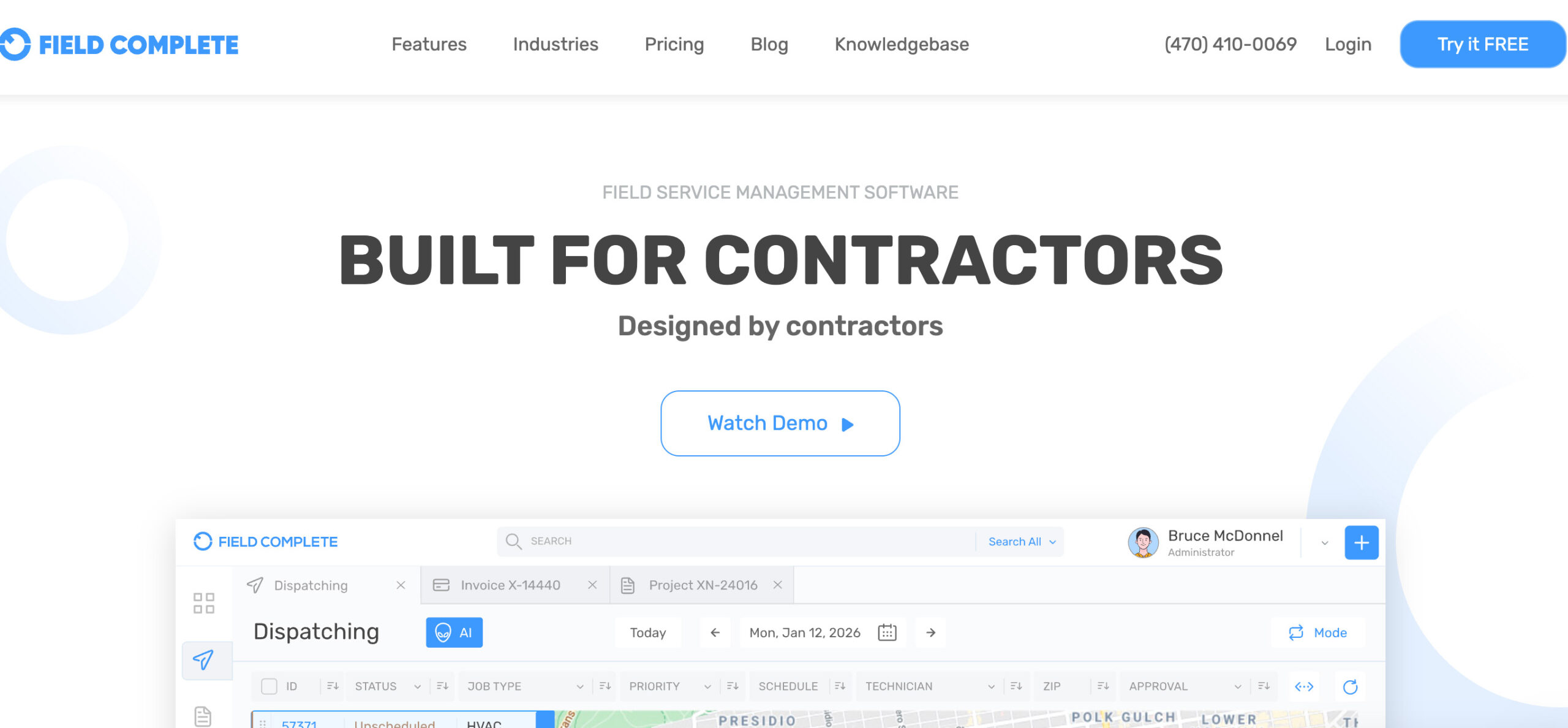
Field Complete is built for field service businesses, including electrical contractors. It handles work orders, scheduling, and customer communication in one system.
Electricians can use features like automated dispatch, mobile job tracking, and integrated payments. It also includes CRM tools for tracking customer history, managing service contracts, and handling follow-ups, along with basic inventory management to monitor stock and generate purchase orders.
Plans and pricing
Field Complete uses custom pricing based on company size and feature requirements. Most electrical contractors can expect to pay $50-$100 per user per month.
How much does electrical contractor software cost?
Electrical contractor software pricing varies widely based on features, company size, and specific requirements.
Basic field service management software typically costs $35–$100 per user per month. This covers essentials like scheduling, dispatching, invoicing, and customer management.
More advanced software with features like detailed estimating, project management, and financial reporting tends to range from $100–$300 per user per month.
But don’t just look at the monthly price. Software that helps you win more bids, complete work faster, and improve cash flow often pays for itself.
A central hub: Electrical service software for contractors
While specialty tools exist, most electrical contractors benefit more from a solution built to unify disconnected tools. This prevents switching between apps, and everything from customer contact to payment runs in one system.
Method CRM is built for this.
It’s tailored for electrician service-based businesses and integrates seamlessly with QuickBooks. The platform includes all the tools electrical contractors need to operate efficiently.
It’s not generic software repurposed for trades. It’s made to be configured for real-world electrical workflows.
Want to manage permits? Track subcontractors? Done.
Method’s scheduling and dispatching tools let you assign techs by skill, route them efficiently, and send notifications to customers automatically. When something changes, the system updates everything, so no calls or texts are needed.
Its Android and iOS mobile apps give techs full access in the field. They can pull up job and customer information, update progress, and even take payments without returning to the office.
Method isn’t a one-size-fits-all system. Its team works with you to customize it for your specific business needs.
No extra steps — just the tools you actually use.
Curious? Schedule a demo today and see why thousands of service businesses trust Method.
Closing thoughts
The right software is all about solving the real problems in your workflow. Whether you need better scheduling, faster invoicing software, or accurate estimates, choose a tool that fits your current needs and can grow with your business. Keep it simple, make sure your entire team will actually use it, and don’t overlook the value of good support and easy onboarding.
Sometimes paying a bit more upfront saves you time, money, and frustration down the line.
FAQs
Why consider an electrical contractor software?
Electrical contractor software brings everything into one place. It improves job management, scheduling, customer experience, invoicing, communication, and admin efficiency. Most businesses see results (faster payments, smoother workflows, happier customers) within months. And as you scale, it keeps up. Manual systems break down once your team grows.
What is an electrical contractor?
An electrical contractor is a business or individual who installs, maintains, or repairs electrical systems. They work on residential, commercial, or industrial electrical projects, from simple lighting jobs to full-scale infrastructure wiring. Most are licensed, and many act as subcontractors on large builds.
Is electrical business software suitable for small businesses?
Absolutely. Many platforms are designed for small to mid-sized teams. You don’t need every feature, just the right ones. Start with scheduling, invoicing, and customer management. As your business grows, your software should be able to grow with you.



